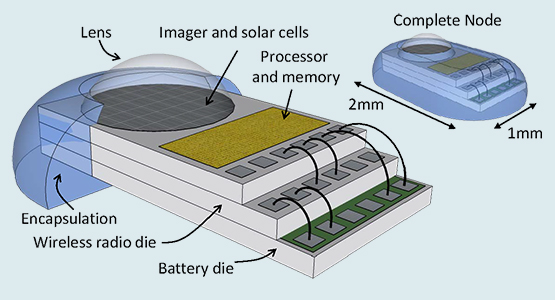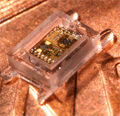Making smart dust a reality
This research is expected to have a fundamental and long term impact on a diverse set of applications ranging from energy conservation to health care.

 Enlarge
Enlarge
Faculty at the University of Michigan are continuing their pursuit of millimeter-scale computing with a 5-year, $3M NSF grant to develop cubic-mm size sensor nodes. These sensing platforms will incorporate transducers (i.e. imaging, temperature sensing), wireless communication, a high accuracy timer, processor, memory, battery and energy harvesting in a 1mm3 volume. Current wireless sensor nodes measure at least 1cm3 and are hampered by short lifetimes.
To facilitate widespread research into this next computing frontier, they plan to build 100 first and second generation sensor node platforms and disseminate them to other researchers for trials in a wide range of applications.
In the process, they will be taking the “smart dust” concept from fiction to reality.
The development and dissemination of cubic-mm sensor nodes will enable applications that have long been envisioned for sensor networks.
For example, sensory skins could cover surfaces with a dense deployment of nodes that monitor the properties of the manifold itself or its surroundings. This would allow detection and tracking of movement or measuring indoor temperature or light for more intelligent temperature control.
Thinking and linking applications can give everyday objects sensing, computing, communication, and tracking ability, allowing, for instance research into the social network patterns of small insects like bees or roaches or asset tracking in dynamic environments like hospitals.

 Enlarge
Enlarge
Finally, implantable intelligence gives visibility and voice to deeply embedded physical and biological processes, e.g, malignant tumor growth monitoring or intra-ocular pressure sensing to determine the risk for retinal detachment. A platform for an implantable intra-ocular pressure sensor at the target size has already been developed at the University of Michigan, and this new program will extend those results.
Leading the project are Prof. David Wentzloff, who will focus on the wireless communication, Prof. David Blaauw and Prof. Dennis Sylvester who will focus on processing and power management electronics, and Prof. Prabal Dutta and Prof. Thomas Schmid (University of Utah) who will focus on system integration, system software, network protocols, and a simulator and toolchain.
This research is expected to have a fundamental and long term impact on a diverse set of applications with critical societal import, ranging from energy conservation, environmental quality management, and health care.
 MENU
MENU 
